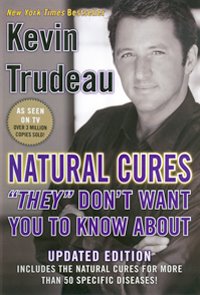According to current FDA policy, the answer is a flat "NO!"
No natural treatment, whether it be fish oil (as a nutritional supplement), l-arginine, vitamin D, magnesium, various flavonoids like theaflavin or resveratrol, can be declared to treat or cure any disease. That's why you see the evasive and vague wording on nutritional supplements, nutraceuticals, and various foods, like "Supports heart health" or "Supports healthy cholesterol". Claiming, for instance, that taking 6000 mg per day of a standard OTC fish will reduce triglycerides and stating so on the label of a supplement is unlawful and prosecutable.
Think what you will of Mr. Kevin Trudeau (author of Natural Cures They Don't Want You to Know About"): visionary, consumer advocate, David vs. the Goliath of the FDA and "Big Pharma", or huckster, scam artist, and one-time felon. But Trudeau got it right on one important issue: The FDA dictates what claims can be made to treat disease. On one of his ubiquitous informercials, Trudeau states:

"...the way the system works today, you have the Food and Drug Administration—the FDA, and you have the drug industry. They really work in tandem. Unfortunately, there’s an unholy alliance there. People don’t know that the majority of commissioners of the FDA, which allegedly regulates the drug industry, and the food industry—Food and Drug Administration, the commissioners of the FDA—the majority of them—go to work directly for the drug companies upon leaving the FDA and are paid millions and millions and millions of dollars. Now in any other format, that would be called bribery; that would be called a conflict of interest; that would be called payoffs. That’s exactly what’s happening right now. So what has occurred is the Food and Drug Administration is really working in tandem with the drug industry to protect their profits. Example: The Food and Drug Administration says that only a drug can diagnose, prevent, or cure any disease."
He goes on to say that
"...the Food and Drug Administration says only a drug--nothing else--can cure, prevent, or diagnose a disease. Therefore the Food and Drug Administration continues to call more and more and more things diseases. Therefore they eliminate all-natural remedies. No one can say what a natural remedy can do if it’s been classified as a disease. So Attention Deficit Disorder is now a disease. Therefore only a drug can cure, prevent, or diagnose it. Cancer is a disease. Acid reflux is now a disease. Obesity is now a disease."
(PLEASE do not construe this as an endorsement of Mr. Trudeau's overall opinions. But I do think he's right on this one point.)
The stated purpose of this restrictive policy is to protect the public. Indeed, in years past before protective legislation, ineffective and even poisonous products were commonly sold as therapeutic treatments. (Remember cocaine and morphine in cold remedies? Lead and other toxic agents were also common.) Unfortunately, a huge gap has emerged as clinical data accumulates that support the efficacy of nutritional treatments and other non-traditional methods to treat or alleviate diseases. Any disease, or anything construed as disease as Trudeau points out, can onlybe treated by a drug.
In the FDA's defense, they have made slow progress in allowing "claims" of benefits for several supplements and food substances, such as the beta-glucan of oat products, soy protein, and most recently barley (for cholesterol reduction). The scrutiny is quite thorough and the wording of the policy is quite specific. Regarding oat products, for instance, the policy states:
"FDA concluded that the beta-glucan soluble fiber of whole oats is the primary component responsible for the total and LDL blood cholesterol-lowering effects of diets that contain these whole oat-containing foods at appropriate levels. This conclusion is based on review of scientific evidence indicating a relationship between the soluble fiber in these whole oat-containing foods and a reduction in the
risk of coronary heart disease.
Food products eligible to bear the health claim include oat bran and rolled oats, such as oatmeal, and whole oat flour...To qualify for the health claim, the whole oat-containing food must provide at least 0.75 grams of soluble fiber per
serving. The amount of soluble fiber needed for an effect on cholesterol levels is about 3 grams per day."
(Source: FDA Talk Paper which can be viewed in its entirety at http://www.fda.gov/bbs/topics/ANSWERS/ANS00782.html.)
In light of the boom in nutritional and non-traditional research that validate or refute efficacy, is such a policy still necessary? Or does it inhibit the open dissemination of information and result in a extraordinary monopolization of health treatment for the drug companies?
This debate will likely rage for the next two or more decades, particularly as drug companies are increasingly viewed as profit-seeking enterprises and more validation is gained by non-drug treatments.
For the moment, don't dismiss a "treatment" because it doesn't come by prescription. But don't reject a drugjust because it is a prescription. We need to strike a healthy, rational balance somewhere in between.